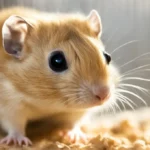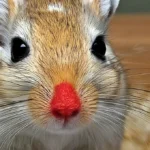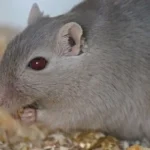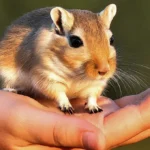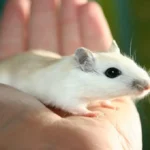Gerbils are fascinating creatures, often chosen as pets for their curious and active nature. However, new and even experienced gerbil owners sometimes express concern over their pets’ sleeping habits, wondering if their furry friends are getting too much or too little rest.
Understanding gerbil sleep patterns is crucial to ensuring their well-being and can help alleviate worries about their health and happiness.
In this article we will discuss about the sleep habits of gerbils, exploring why these small mammals might seem to sleep more than expected and what you can do to support their natural behaviors.
Understanding Gerbil Sleep Patterns
Normal Sleep Habits of Gerbils
Contrary to popular belief, gerbils are not strictly nocturnal or diurnal. These small rodents are actually metaturnal, meaning they are active during both day and night, often in short bursts.
On average, a gerbil can sleep up to 12 hours a day, divided into several naps throughout the 24-hour cycle. This pattern allows them to conserve energy and remain alert to any potential threats in their environment.
Seasonal changes significantly influence gerbil sleep patterns. During winter, gerbils tend to sleep more and reduce their activity levels, a behavior thought to be linked to the shorter daylight hours and lower temperatures.
Age also plays a crucial role in determining how much a gerbil sleeps. Young and elderly gerbils usually require more rest compared to their adult counterparts, primarily due to growth and health reasons.
Factors Influencing Sleep
Several factors can affect a gerbil’s sleep pattern, including:
- Seasonal Changes: Gerbils naturally adjust their sleep habits according to the season, sleeping more in the colder months.
- Age: Young gerbils (pups) and older gerbils tend to sleep more than those in their prime adult years.
- Activity Levels: Highly active gerbils may need more rest to recover energy.
Reasons Why Your Gerbil Might Be Sleeping More Than Usual

Boredom and Lack of Stimulation
A common reason gerbils sleep more than usual is a lack of stimulation in their environment. Gerbils are naturally curious and active animals that require regular mental and physical stimulation.
Without engaging activities or toys, they may resort to sleeping out of boredom. Ensuring your gerbil’s habitat is enriched with tunnels, chew toys, and exercise wheels can encourage more active periods and reduce excessive sleeping.
Loneliness
Gerbils are social animals that thrive in the company of their kind. A solitary gerbil may sleep more due to loneliness or depression. If possible, keeping gerbils in pairs or small groups can promote social interaction and stimulate activity, preventing excessive sleep due to loneliness.
Illness or Health Issues
Sometimes, getting too much sleep is a sign of a health problem. Gerbils, like many small animals, are adept at hiding signs of illness, so increased sleep could be one of the few visible symptoms.
Respiratory infections, digestive problems, and other health conditions can lead to increased lethargy and sleep. Observing other signs of illness, such as changes in appetite, unusual discharge, or a lack of grooming, is crucial.
If you suspect your gerbil is unwell, consulting a veterinarian experienced with small animals is essential for proper diagnosis and treatment.
Adjustment Period
Newly adopted gerbils may also exhibit altered sleep patterns as they adjust to their new environment. The stress of relocation and acclimatization can lead to temporary changes in behavior, including increased sleep.
Giving your new pet time to adjust, along with gentle handling and a quiet, comfortable habitat, can help ease the transition and normalize sleep patterns.
Understanding the natural sleep habits of gerbils and the factors that influence their rest is key to providing a healthy and stimulating environment for these delightful pets.
Also read: Do Gerbils Hibernate?
Enhancing Your Gerbil’s Environment for Better Health and Happiness
Creating a Stimulating Habitat
A stimulating environment is crucial for the well-being of your gerbil. Gerbils are naturally inquisitive and thrive in environments that mimic their natural habitat. To prevent boredom and encourage activity, consider the following tips:
- Varied Bedding for Digging: Gerbils love to dig and create tunnels. Providing a deep layer of safe, absorbent bedding material can encourage this natural behavior.
- Exercise Wheel: A solid, gerbil-sized exercise wheel allows your pet to run and stay active, even within the confines of their cage.
- Toys and Chewables: Wooden blocks, cardboard tubes, and other safe materials can keep your gerbil entertained and help maintain their dental health.
- Regular Changes: Regularly rearranging your gerbil’s habitat and introducing new toys can keep the environment fresh and engaging.
The Role of Diet in Activity Levels
Nutrition plays a significant role in your gerbil’s health and energy levels. A balanced diet ensures your gerbil has the necessary nutrients to stay active and healthy:
- High-Quality Gerbil Food: Provide a balanced commercial gerbil mix as the base of their diet.
- Fresh Vegetables: Introduce small amounts of fresh vegetables to provide variety and additional nutrients.
- Protein Sources: Occasional treats of mealworms or boiled eggs can supplement your gerbil’s protein intake.
- Avoid Sugary and Fatty Foods: These can lead to health issues and should be avoided.
Social Interactions
Gerbils are social creatures that benefit significantly from interaction with their own kind:
- Companionship: Whenever possible, keep gerbils in pairs or small groups to prevent loneliness and stimulate social interaction.
- Observation: Watch for signs of bonding, such as grooming and playing, which indicate a healthy social environment.
- Introductions: Introduce new gerbils carefully to prevent stress and ensure compatibility.
When to Seek Veterinary Care
Recognizing when your gerbil needs professional medical attention is vital for their health. Here are signs that it’s time to visit the vet:
- Persistent Changes in Sleep Patterns: While it’s normal for gerbils to have varied sleep schedules, consistent oversleeping or lethargy warrants a vet visit.
- Signs of Illness: Symptoms such as sneezing, discharge from the eyes or nose, unexplained weight loss, or changes in eating habits are red flags.
- Behavioral Changes: Sudden aggression, excessive grooming, or a lack of interest in usual activities can indicate health issues.
FAQs
Why does my gerbil sleep all day and night?
Gerbils have unique sleep patterns, often sleeping in short bursts throughout the day and night. Excessive sleep could indicate boredom, loneliness, or health issues. Enriching their habitat and ensuring they have companions can help regulate their sleep.
Is it normal for a gerbil to sleep more in winter?
Yes, it’s normal for gerbils to sleep more during winter. The shorter daylight hours and cooler temperatures naturally encourage gerbils to conserve energy by sleeping more, mirroring their behavior in the wild during colder months.
How can I tell if my gerbil is sleeping too much due to illness?
If your gerbil sleeps excessively and shows other signs of illness, such as lack of appetite, lethargy, or unusual discharge, it may be sick. A sudden increase in sleep accompanied by these symptoms warrants a vet visit.
What can I do to make my gerbil more active?
To encourage activity, provide a stimulating environment with exercise options like wheels, tunnels, and toys. Ensure they have a balanced diet and, if possible, the company of other gerbils to promote social interaction and play.
Why is my gerbil sleeping out in the open?
Gerbils usually prefer sleeping in hidden or covered areas for safety. Sleeping out in the open could indicate they feel extremely safe in their environment or, conversely, it might be a sign of illness or distress if other hiding spots are available but ignored.
Conclusion
Understanding and catering to your gerbil’s natural behaviors and needs is the key to fostering a healthy and joyful life for your furry friend. By providing a stimulating environment, a balanced diet, and companionship, you can ensure your gerbil remains active and engaged.
Remember, changes in sleep patterns can sometimes signal deeper issues, so staying observant and seeking veterinary advice when necessary is crucial.
Embrace the joy of gerbil ownership by nurturing their curious and lively nature, and enjoy the rewarding experience of watching your gerbil thrive in a loving, well-prepared home.






